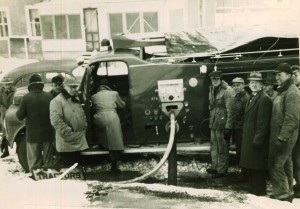Be prepared for the hazards of winter weather
Well we did receive an early warning that this last storm was coming. State, County and Local Officials sent out numerous news alerts and email warnings. Were you prepared? If not then that was Mother Nature’s little wake-up call to put something together for what could be a long winter.
With the reported amounts of up to 18” of snow did anyone think about the possibility of Carbon Monoxide poisoning? Each year, an average of 430 Americans die from unintentional carbon monoxide poisoning, and there are more than 20,000 visits to the emergency room with more than 4,000 hospitalizations.
Carbon monoxide-related deaths are highest during colder months. These deaths are likely due to increased use of gas-powered furnaces and alternative heating, cooking, and power sources used inappropriately indoors during power outages.
Never use a generator, grill, camp stove or other gasoline, propane, natural gas or charcoal burning devices inside a home, garage, basement, crawlspace or any partially enclosed area. Locate unit away from doors, windows and vents that could allow carbon monoxide to come indoors.
Keep these devices at least 20 feet from doors, windows, and vents. Install carbon monoxide alarms in central locations on every level of your home and outside sleeping areas to provide early warning of accumulating carbon monoxide.
If the carbon monoxide alarm sounds, move quickly to a fresh air location outdoors or by an open window or door. Call for help from the fresh air location and remain there until emergency personnel arrive to assist you. Make sure that your furnace exhaust has not been covered by the deep snow and/or ice has not built up blocking the pipe.
Since we have now started into the winter months here are some tips to help you survive in comfort. If possible stay safe and indoors during the storm. If you have to leave your house make sure you walk carefully on snow covered, icy, walkways.
Use “creepers” on your boots or shoes to give you traction on the snow and ice. Avoid overexertion when shoveling snow. Overexertion can bring on a heart attack—a major cause of death in the winter. Use caution, take breaks, push the snow instead of lifting it when possible, and lift lighter loads. Keep dry.
Change wet clothing frequently to prevent a loss of body heat. Wet clothing loses all of its insulating value and transmits heat rapidly. The signs of frostbite occur when the skin and body tissue just beneath it freezes. The first signs will be loss of feeling and white or pale appearance in extremities, such as fingers, toes, earlobes, face, and the tip of the nose.
Keep exposed skin covered, but do not rub the affected area in an attempt to warm it up. Seek medical help immediately. The signs of hypothermia come from dangerously low body temperature. If you have lived in Wisconsin long enough you have had the first stages of hypothermia which is the uncontrollable shivering.
If symptoms of hypothermia are detected take the person’s temperature. If it is below 95°, seek medical attention immediately. Get the victim to a warm location. Remove wet clothing. Warm the center of the body first by wrapping the person in blankets or putting on dry clothing.
Give warm, non-alcoholic beverages if the victim is conscious. Seek medical help immediately. Many times this is treated at home without medical help but because frostbite and hypothermia both result from exposure, first determine whether the victim also shows signs of hypothermia. Hypothermia is a more serious medical condition and requires emergency medical assistance. During the storm drive only if it is absolutely necessary.
Fighting fires and running ambulance calls in this weather takes a toll on us. Remember we are here 24/7/365 and when you call 911 we will respond. Although we keep the vehicles inside all warm and ready to go we have special procedures to follow so when we arrive the vehicles are not all froze and unable to do their job. There will be some delay from the weather so be patient with us, we are trying our best. Road conditions make it even more challenging during this time of year. We haul lots of water to the rural fires and it gets spilled along the way making roads even slipperier than when we started.
Many of our responders will be coming from home and run into the same conditions you find when going to work or school early in the morning. Frosted windshields, frozen door locks, drifted driveways and unplowed roads are all dealt with on a daily basis.
They may even be coming from that holiday dinner with their families, company parties or church. Please try and get your sidewalks and driveways cleared up as soon as possible and look out for your neighbors that could use a helping hand. This is the time of the year to give something back and it doesn’t always have to be purchased.
Do a good deed for friends, neighbors or a complete stranger.
Until next week, stay safe
Chief Rindfleisch
Courtesy photo
Clinton firefighters Harry Strom, Norm Rhodes, Henry Hahn, Herb Reffue, Rollo Mason, Howard Dudley and Fred Howland trained in this undated photo.


